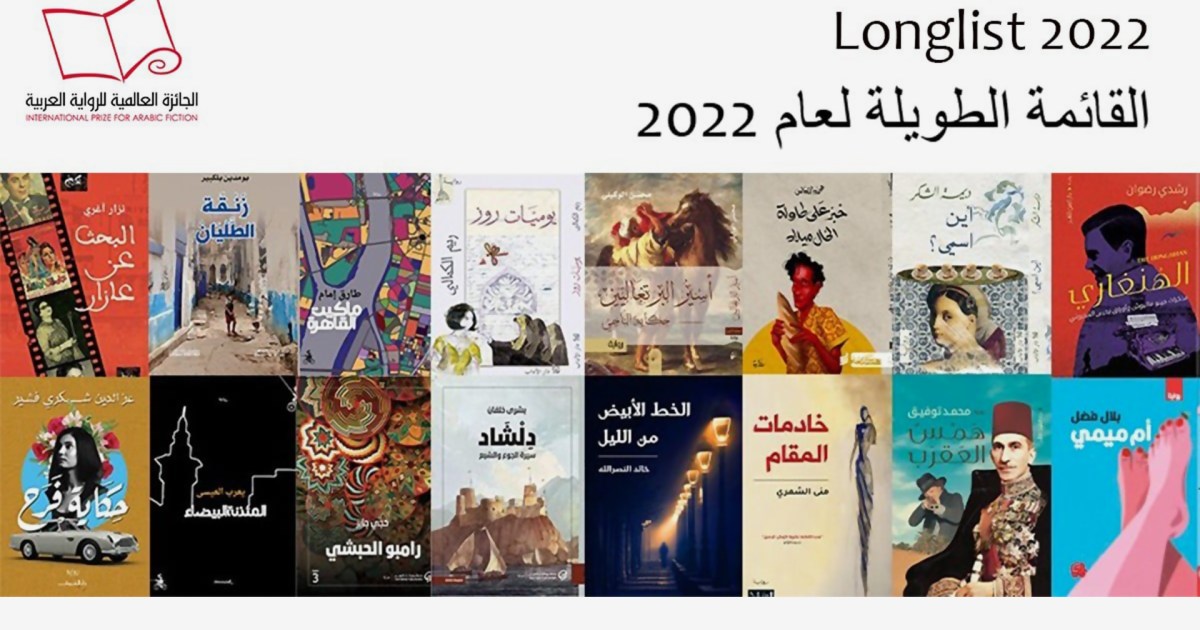Today, Wednesday, the International Prize for Arabic Fiction announced the long list of its 15th session, which included 16 novels issued during the period from July 1, 2020 until the end of June 2021, among 122 novels submitted for the award.
The list is long
The story of the friendship between the two friends, the protagonist of the Syrian writer Nizar Agri’s novel, “The Search for Azar” revolves around the Syrian city of Qamishli, where religions, races, cultures and sects mix in an (ancient) city and a dreamy time.
As for the Eritrean novelist Haji Jaber, winner of the Sharjah and Katara Prizes, he entered the long list with his historical novel "Rambo al-Habashi", which traces the life of the French poet Arthur Rimbaud in Ethiopia, but removes the French poet to the sidelines, making his lover Almaz the kitten the center of the narrative.
The Egyptian novelist Tariq Imam entered the list with his novel “Maquet of Cairo”, which begins in the year of the revolution 2011, but quickly moves to a parallel and unknown Cairo that amaze and surprise the reader. In the past from the city of "Annaba", called "The Italian alley", it illuminates - during more than 200 pages - the demolition awaited by this old neighborhood, and the eviction that its residents are awaiting, under stifling conditions that do not give weight to heritage or the values of the beauty of the past, and do not care about the suffering of a crushed class par excellence.
The novel "Whisper of the Scorpion" by the novelist and diplomat Muhammad Tawfiq follows the journey of the head of the Egyptian Royal Court, Ahmed Hassanein Pasha, and his journey to the Great Desert to explore unknown places with his English companion.
As for the novel "Dilshad - A Biography of Hunger and Satisfaction" by the Omani writer Bushra Khalfan, it traces the unknown history of Muscat through the story of a miserable man starving and destitute in the city between the sea and the mountains.
The list included "The Hungarian", the first novel by the Algerian writer and playwright Rushdi Radwan, and its events take place in the years of World War II between a pianist from a remote Hungarian town who escaped from forced colonial conscription in Algeria.
As for "Where's my name?"
The historical work of the Syrian writer Dima Al-Shukr takes place in the 19th century, when orientalists steal the heritage of Arab cities.
The list included the novel of the Kuwaiti storyteller Mona Al-Shammari "The Maids of the Maqam", which traces the lives of five women and the beliefs of the people of Failaka Island in the fifties of the last century.
The "White Minaret" of the Syrian journalist Yaroub Al-Issa emerged, loaded with historical and geographical details and many Damascene questions. As for the Egyptian novelist Ezz El-Din Shukri Fasheer, he entered the list with his novel "The Story of Farah", which highlights the feelings of its women and the struggles of love, motherhood and freedom.
Also on the list is "Umm Mimi" by the Egyptian writer Bilal Fadl, which shifts between classical and colloquial, the novel "The Rose's Diaries" by the Emirati writer Reem Al Kamali, which takes place in the mid-sixties of the last century before the establishment of the State of the Union in the Emirates, and the Kuwaiti writer Khaled Al-Nasr's novel "The White Thread of the Night" “Bread on the Table of Uncle Milad” by the young Libyan writer Muhammad Al-Naas and “The Prisoner of the Portuguese” by the Moroccan Mohsen Al-Wukili, winner of the Ghassan Kanafani Prize, which traces the struggle of the writer and the censor.
Judgement comity
The award is valued at $50,000, and is sponsored by the Abu Dhabi Center for the Arabic Language of the Department of Culture and Tourism in Abu Dhabi.
The award also revealed the names of the jury for this year, headed by the Tunisian critic and novelist Shukri Al-Mabkhout, and the membership of the Lebanese writer Iman Humaidan, the professor of Arabic literature Bayan Rihanova, the Libyan poet Ashour Al-Tuwaibi, and the Kuwaiti critic Saadia Mufreh.
For his part, Al-Mabkhout said in a statement, "The novels nominated by Arab publishing houses in this session were distinguished by the abundance of good works," which once again confirms the recovery and development that the Arab novel is witnessing, making it the literary genre best able to express the concerns of Arab peoples today in their various local environments.
He added, "This long list presents to the reader and follower of the Arab novel a rich, rich literary feast that represents different models of the interpretations of Arab novelists in the past year. It was characterized by diversity, wit, innovation, and cognitive and aesthetic efforts."
The International Prize for Arabic Fiction will announce its shortlist in March, and the winning novel will be announced in May.

